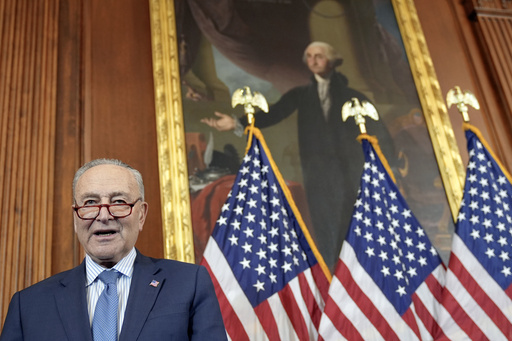The Senate approved a substantial defense bill on Wednesday, which includes notable pay increases for junior enlisted personnel, addresses the rising influence of China, and raises overall military spending to $895 billion. This legislation also removes access to transgender medical treatments for the children of military members.
Typically, the annual defense authorization bill receives robust bipartisan support and has a successful track record in Congress for nearly sixty years. However, recent debates over Pentagon policies have spilled over into cultural issues, complicating negotiations. This year, Republicans sought to introduce priorities appealing to social conservatives, which led to extended discussions and diminished backing from Democrats.
Despite the controversies, the bill passed with a wide margin of 85-14, paving its way to President Joe Biden for approval. A total of eleven senators associated with the Democratic caucus and three Republican senators voted against the bill.
Senate Majority Leader Chuck Schumer, a Democrat from New York, expressed that while the bill has its imperfections, it still contains valuable measures for which Democrats advocated. He highlighted that it has robust provisions aimed at countering the Chinese Communist Party regarding national security.
In the House, the majority of Democrats opposed the measure last week after House Speaker Mike Johnson advocated for the inclusion of a ban on military health coverage for transgender medical care for minors. Ultimately, the bill passed easily with a vote count of 281-140.
Leading Senate Republicans argued that the defense budget increase of 1% is insufficient, especially given the current global instability undermining U.S. leadership. They are eyeing a more significant defense funding push once they regain control of the White House and Congress next year. Republican Senator Roger Wicker emphasized that the nation currently faces one of the most perilous national security situations since World War II and called for increased defense spending that transcends pre-established caps put in place by last year’s bipartisan debt ceiling agreement.
The defense bill shapes essential Pentagon policy, although it still requires backing from an appropriations package to be fully realized. Senate Republican leader Mitch McConnell of Kentucky warned that if the budget does not increase significantly, critical provisions like pay raises for enlisted members may jeopardize investments in vital weapons systems and munitions needed for conflict deterrence and safety.
As part of the new legislation, junior enlisted service members will see an increase of 14.5% in pay, while others will have a 4.5% raise. Lawmakers emphasized that these changes are crucial for enhancing service members’ quality of life, particularly as many military families struggle with food insecurity and need government assistance.
Voting in favor, Senator Jack Reed, a Democrat from Rhode Island, stated that the legislation comprises significant improvements in quality of life, addressing aspects like childcare, housing, medical services, and support for military spouses.
Additionally, the legislation charts a firm course towards confronting China by creating a fund aimed at providing resources to Taiwan, paralleling U.S. support for Ukraine. It also incorporates investments in emerging military technologies including artificial intelligence and strengthens domestic ammunition production.
The U.S. has increasingly moved to restrict military procurement of Chinese products, with the latest defense bill expanding these bans to cover a range of Chinese goods, including garlic in military stores and drone technology.
The Chinese foreign ministry responded with skepticism, labeling the bans as trivial, and questioned the basis of U.S. assertions regarding national security risks posed by various Chinese products.
While there is a general consensus among Congress members about China’s emerging threat, the bill’s negotiations highlighted divisions primarily over cultural matters. A Republican-led version of this bill passed in the House in June included provisions to eliminate funding for abortion expenses, terminate gender-affirming care for transgender service members, and remove diversity initiatives within the military.
Although most controversial provisions did not make the final version of the bill, Republicans anticipate significant changes to Pentagon policies if Donald Trump returns to office next January. The bill continues to prohibit funding for critical race theory education in the military and restricts TRICARE from covering gender dysphoria treatment for individuals under 18 if it could cause sterilization.
For some Democrats, the removal of transgender medical treatment for minors proved to be a dealbreaker. Senator Tammy Baldwin from Wisconsin expressed her disapproval during a speech, stating that this change would adversely impact 6,000 to 7,000 families, according to estimates from her office.
She remarked on the NDAA’s tradition of uniting various political divides for the common good and expressed disappointment that this year, support for service members’ rights to access appropriate health care for their children was neglected.


